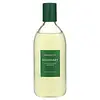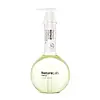What's inside
What's inside
 Key Ingredients
Key Ingredients

 Benefits
Benefits

 Concerns
Concerns

 Ingredients Side-by-side
Ingredients Side-by-side

Rosmarinus Officinalis Leaf Extract
AntimicrobialWater
Skin ConditioningPinus Densiflora Leaf Extract
AntimicrobialSodium Methyl Cocoyl Taurate
CleansingSodium Cocoyl Isethionate
CleansingSodium Methyl Oleoyl Taurate
CleansingLauryl Betaine
CleansingPropanediol
SolventSodium Chloride
MaskingErythritol
HumectantLauryl Glucoside
CleansingSalicylic Acid
MaskingRosmarinus Officinalis Leaf Oil
MaskingOcimum Basilicum Leaf Extract
Skin ConditioningOcimum Sanctum Leaf Extract
Skin ConditioningOriganum Vulgare Leaf Extract
Skin ConditioningZingiber Officinale Root Extract
MaskingBifida Ferment Lysate
Skin ConditioningLactobacillus Ferment Lysate
Skin ConditioningArginine
MaskingBiotin
AntiseborrhoeicPanthenol
Skin ConditioningCaffeine
Skin ConditioningPolyquaternium-10
Caprylyl Glycol
EmollientCedrus Atlantica Bark Oil
MaskingButylene Glycol
HumectantIllicium Verum Fruit Extract
PerfumingCupressus Sempervirens Oil
MaskingAbies Sibirica Oil
MaskingNiacinamide
SmoothingStyrax Benzoin Resin Extract
MaskingDipropylene Glycol
HumectantLimonene
PerfumingGlycerin
HumectantMelia Azadirachta Leaf Extract
Skin ConditioningMelia Azadirachta Flower Extract
Skin ConditioningMalt Extract
Skin ProtectingCoccinia Indica Fruit Extract
Skin ConditioningAmber Powder
Solanum Melongena Fruit Extract
Skin ConditioningCurcuma Longa Root Extract
MaskingCorallina Officinalis Extract
Skin ConditioningMoringa Oleifera Seed Oil
EmollientDisodium EDTA
Isopropyl Alcohol
SolventSodium Acetate
Buffering1,2-Hexanediol
Skin ConditioningRosmarinus Officinalis Leaf Extract, Water, Pinus Densiflora Leaf Extract, Sodium Methyl Cocoyl Taurate, Sodium Cocoyl Isethionate, Sodium Methyl Oleoyl Taurate, Lauryl Betaine, Propanediol, Sodium Chloride, Erythritol, Lauryl Glucoside, Salicylic Acid, Rosmarinus Officinalis Leaf Oil, Ocimum Basilicum Leaf Extract, Ocimum Sanctum Leaf Extract, Origanum Vulgare Leaf Extract, Zingiber Officinale Root Extract, Bifida Ferment Lysate, Lactobacillus Ferment Lysate, Arginine, Biotin, Panthenol, Caffeine, Polyquaternium-10, Caprylyl Glycol, Cedrus Atlantica Bark Oil, Butylene Glycol, Illicium Verum Fruit Extract, Cupressus Sempervirens Oil, Abies Sibirica Oil, Niacinamide, Styrax Benzoin Resin Extract, Dipropylene Glycol, Limonene, Glycerin, Melia Azadirachta Leaf Extract, Melia Azadirachta Flower Extract, Malt Extract, Coccinia Indica Fruit Extract, Amber Powder, Solanum Melongena Fruit Extract, Curcuma Longa Root Extract, Corallina Officinalis Extract, Moringa Oleifera Seed Oil, Disodium EDTA, Isopropyl Alcohol, Sodium Acetate, 1,2-Hexanediol
Water
Skin ConditioningSodium C14-16 Olefin Sulfonate
CleansingLauryl Betaine
CleansingSodium Cocoamphoacetate
CleansingDipropylene Glycol
HumectantPhyllostachys Pubescens Meristem Cell Lysate
Skin ConditioningArgania Spinosa Callus Culture Extract
Skin ConditioningMalus Domestica Fruit Cell Culture Extract
Skin ConditioningVitis Vinifera Fruit Cell Extract
Skin ConditioningGlutamic Acid
HumectantSodium PCA
HumectantKeratin
Skin ConditioningHydrolyzed Keratin
HumectantPrunus Domestica Seed Extract
EmollientArgania Spinosa Kernel Oil
EmollientLupinus Albus Seed Oil
Skin ConditioningMangifera Indica Seed Oil
EmollientTheobroma Grandiflorum Seed Butter
Skin ConditioningAdansonia Digitata Seed Oil
EmollientCarapa Guaianensis Seed Oil
Skin ConditioningSclerocarya Birrea Seed Oil
HumectantOpuntia Ficus-Indica Seed Oil
EmollientArgan Oil Polyglyceryl-6 Esters
EmollientSodium PEG-7 Olive Oil Carboxylate
EmulsifyingIsomalt
HumectantPolyquaternium-10
Sodium Chloride
MaskingButylene Glycol Laurate
EmollientXanthan Gum
EmulsifyingPPG-2 Cocamide
Polysorbate 20
EmulsifyingLecithin
EmollientBenzotriazolyl Dodecyl P-Cresol
UV AbsorberGlycerin
HumectantCitric Acid
BufferingTocopherol
AntioxidantDisodium EDTA
Sodium Benzoate
MaskingPhenoxyethanol
PreservativeParfum
MaskingCI 19140
Cosmetic ColorantCI 42090
Cosmetic ColorantCI 17200
Cosmetic ColorantLimonene
PerfumingLinalool
PerfumingWater, Sodium C14-16 Olefin Sulfonate, Lauryl Betaine, Sodium Cocoamphoacetate, Dipropylene Glycol, Phyllostachys Pubescens Meristem Cell Lysate, Argania Spinosa Callus Culture Extract, Malus Domestica Fruit Cell Culture Extract, Vitis Vinifera Fruit Cell Extract, Glutamic Acid, Sodium PCA, Keratin, Hydrolyzed Keratin, Prunus Domestica Seed Extract, Argania Spinosa Kernel Oil, Lupinus Albus Seed Oil, Mangifera Indica Seed Oil, Theobroma Grandiflorum Seed Butter, Adansonia Digitata Seed Oil, Carapa Guaianensis Seed Oil, Sclerocarya Birrea Seed Oil, Opuntia Ficus-Indica Seed Oil, Argan Oil Polyglyceryl-6 Esters, Sodium PEG-7 Olive Oil Carboxylate, Isomalt, Polyquaternium-10, Sodium Chloride, Butylene Glycol Laurate, Xanthan Gum, PPG-2 Cocamide, Polysorbate 20, Lecithin, Benzotriazolyl Dodecyl P-Cresol, Glycerin, Citric Acid, Tocopherol, Disodium EDTA, Sodium Benzoate, Phenoxyethanol, Parfum, CI 19140, CI 42090, CI 17200, Limonene, Linalool
 Reviews
Reviews

Ingredients Explained
These ingredients are found in both products.
Ingredients higher up in an ingredient list are typically present in a larger amount.
Dipropylene Glycol is a synthetically created humectant, stabilizer, and solvent.
This ingredient helps:
Dipropylene glycol is technically an alcohol, but it belongs to the glycol family (often considered part of the ‘good’ alcohols). This means it is hydrating and gentle on skin unlike drying solvent alcohols like denatured alcohol.
As a masking agent, Dipropylene Glycol can be used to cover the smell of other ingredients. However, it does not have a scent.
Studies show Dipropylene Glycol is considered safe to use in skincare.
Learn more about Dipropylene GlycolDisodium EDTA plays a role in making products more stable by aiding other preservatives.
It is a chelating agent, meaning it neutralizes metal ions that may be found in a product.
Disodium EDTA is a salt of edetic acid and is found to be safe in cosmetic ingredients.
Learn more about Disodium EDTAGlycerin is already naturally found in your skin. It helps moisturize and protect your skin.
A study from 2016 found glycerin to be more effective as a humectant than AHAs and hyaluronic acid.
As a humectant, it helps the skin stay hydrated by pulling moisture to your skin. The low molecular weight of glycerin allows it to pull moisture into the deeper layers of your skin.
Hydrated skin improves your skin barrier; Your skin barrier helps protect against irritants and bacteria.
Glycerin has also been found to have antimicrobial and antiviral properties. Due to these properties, glycerin is often used in wound and burn treatments.
In cosmetics, glycerin is usually derived from plants such as soybean or palm. However, it can also be sourced from animals, such as tallow or animal fat.
This ingredient is organic, colorless, odorless, and non-toxic.
Glycerin is the name for this ingredient in American English. British English uses Glycerol/Glycerine.
Learn more about GlycerinLauryl Betaine is a surfactant. It helps cleanse your skin by gathering oil, dirt, and other pollutants to be rinsed away.
Limonene is a fragrance that adds scent and taste to a formulation.
It's found in the peel oil of citrus fruits and other plants such as lavender and eucalyptus. The scent of limonene is generally described as "sweet citrus".
Limonene acts as an antioxidant, meaning it helps neutralize free radicals.
When exposed to air, oxidized limonene may sensitize the skin. Because of this, limonene is often avoided by people with sensitive skin.
The term 'fragrance' is not regulated in many countries. In many cases, it is up to the brand to define this term. For instance, many brands choose to label themselves as "fragrance-free" because they are not using synthetic fragrances. However, their products may still contain ingredients such as essential oils that are considered a fragrance.
Learn more about LimonenePolyquaternium-10 is an ammonium salt of hydroxyethylcellulose. It is a white and granular powder used as a film-former and anti-static agent.
This ingredient is commonly found in hair conditioning products. According to a manufacturer, its positive charge makes it great for absorbing hair proteins. The manufacturer also states this ingredient helps with curl retention.
For haircare friends: this ingredient is not a silicone.
Learn more about Polyquaternium-10Chances are, you eat sodium chloride every day. Sodium Chloride is also known as table salt.
This ingredient has many purposes in skincare: thickener, emulsifier, and exfoliator.
You'll most likely find this ingredient in cleansers where it is used to create a gel-like texture. As an emulsifier, it also prevents ingredients from separating.
There is much debate on whether this ingredient is comedogenic. The short answer - comedogenic ratings don't tell the whole story. Learn more about comegodenic ratings here.
The concensus about this ingredient causing acne seems to be divided. Research is needed to understand if this ingredient does cause acne.
Scrubs may use salt as the primary exfoliating ingredient.
Learn more about Sodium ChlorideWater. It's the most common cosmetic ingredient of all. You'll usually see it at the top of ingredient lists, meaning that it makes up the largest part of the product.
So why is it so popular? Water most often acts as a solvent - this means that it helps dissolve other ingredients into the formulation.
You'll also recognize water as that liquid we all need to stay alive. If you see this, drink a glass of water. Stay hydrated!
Learn more about Water